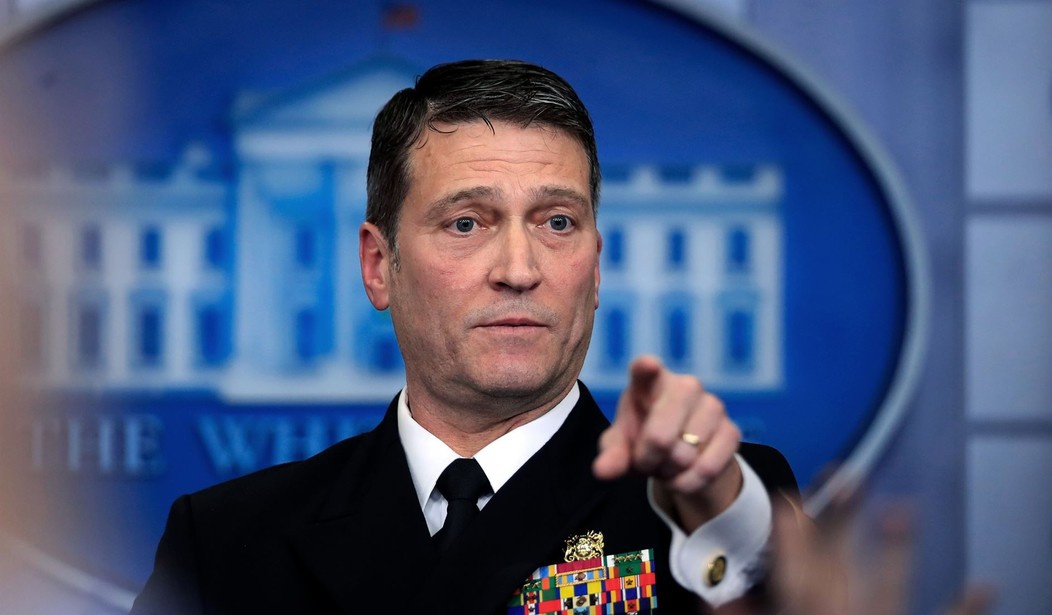This past Thursday, Admiral Ronny Jackson officially withdrew as President Trump’s nominee for Secretary of Veteran Affairs. Admiral Jackson, who served as a White House doctor for President George W. Bush and then as the official physician for President Obama and now President Trump, withdrew amid rumored accusations of very vague and unsubstantiated unbecoming professional conduct in the performance of his medical duties.
Admiral Ronny Jackson said in a statement Thursday that the White House distributed that the allegations were “completely false and fabricated.” President Trump, in an interview with Fox & Friends on Thursday, himself said“ These are all false accusations. These are false. They’re trying to destroy a man.”
While some partisans consider this a victory, in the meantime the Department of Veteran Affairs will continue under acting leadership and without the stability and firm guidance provided by a Senate-confirmed appointee.
The same agency that found itself under horrid scandal in recent years for seeing hundreds of thousands of veterans die while waiting for care beyond prescribed guidelines has had its necessary fixing slowed amid our hyperpolarized partisan environment.
Admiral Jackson’s nomination fiasco also goes to a greater problem within our current federal appointment process. There are currently over 1,242 Presidential appointments within the federal government that require Senate approval and several thousand, of varying roles of seniority, who do not.
Of the 656 essential Senate-approved positions, as of April 27, only 315 have been confirmed. 129 have been formally nominated and await confirmation, while 4 await nomination, and 208 have no nominee.
Recommended
A Washington Post study has shown that President Trump faces both the lowest proportion of nominees confirmed by this point in his Presidency as well as the highest average time from nomination to confirmation, at 84 days.
There also are over 148 current vacancies in the federal judiciary as of April 28, with 68 nominees pending confirmation.
It is worth noting that the confirmation process has become more difficult for Presidents in recent years and administrations, correlated with the increasing hyper-polarization D.C. and our country as a whole has been seeing.
For over two centuries, the Presidential appointment confirmation process has served as an essential check on the power of the Presidency by building legislative approval into the process. For many essential government positions, ranging from Cabinet officials to agency heads, the President nominates and the Senate confirms.
The appointments confirmation process serves an essential role by building cross-branch government consensus, investigating nominees for fitness for the office, and providing public scrutiny and awareness in the form of hearings and investigation. After all, it is essential that the public know who are the government officials that often lead much of the day-to-day policy implementation work that affects their lives.
Like with most of our institutions, they function best when the norm is good-intentioned collaboration. Similarly, our institutions survive, but begin to face strain, when they are seen as mechanisms for political battles rather than the public welfare.
The confirmations process appears to have fallen into such in recent decades. Historically, almost never was a Presidential nomination rejected or even delayed significantly, according to the Heritage Foundation.
However in recent years, tactics such as creative scheduling, using the full time permitted to hold hearings for nominees, filibustering, and other procedural measures have been used often with the de facto goal of simply slowing down or preventing the administration from being fully staffed, thus hurting the opposing party in power.
Both parties are undoubtedly guilty of it. What began as a tit-for-tat way to put hurdles against the other side has now avalanched into a full-blown common practice that is at risk of becoming a new quasi-norm, where it is almost expected to use all the levers of power available against one’s opponent.
Political reality doesn’t expect anyone to be self-sacrificial or naïve in the maneuvering of D.C. However, norms are a real and effective way of governing and should be rebuilt when possible.
If Democrats and Republicans can rebuild cross-party trust, where even when the opposing party is out of power they are given a say at a table, that means when the controlling party changes the other party will be more likely to also give the now-minority party their piece as well. The same goes for between Congress and the administration.
We may never know the truth of the allegations against Admiral Ronny Jackson, who has served three Presidents closely and personally, and still serves President Trump as his personal doctor.
Nonetheless, the disappointing saga surrounding his nomination can hopefully motivate change in our federal appointments process that has devolved so significantly, with great impact on policy that affects millions of Americans.

























Join the conversation as a VIP Member